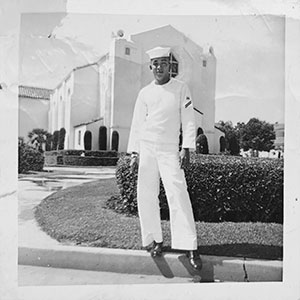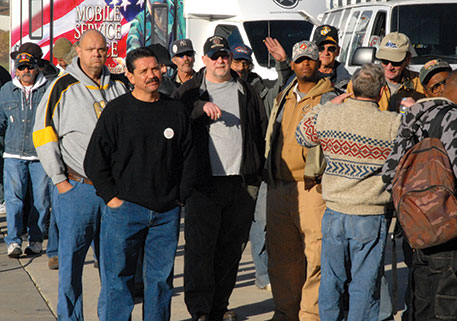
In 2016, Vietnam veteran Jose Flores’ eyesight began to degrade, and the complications affected his ability to safely work in the food service industry. The illness forced him to retire, making his wife, Rebecca, both the family’s sole source of income and primary caregiver for all of Jose’s needs.
“My day starts with preparing Jose’s meals, his drinks and organizing his medications, especially his insulin,” Rebecca said. “If I don’t do these things, Jose would not have a way to take his medications or have enough to eat and drink for the day while I am at work.”
As a 22-year Navy retiree, Jose received a pension and used TRICARE for his health care services, but Rebecca needed to accompany him for all his medical appointments at Walter Reed National Military Medical Center in Bethesda, Maryland, a 30-minute drive from their home. She often had to miss work, which made it financially hard for their family.
“It was a struggle, and we are not proud of this, but we had to borrow money from our children to cover expenses like food and rent,” Rebecca said. “But we had no other choice, and it was important to learn the cause of Jose’s blindness to see how we can manage it, and we discovered it was because of diabetic retinopathy.”
Diabetic retinopathy, which is a complication of diabetes that causes vision loss and blindness, is one of the most prevalent ocular problems among Vietnam veterans. Type 2 diabetes mellitus is a presumptive condition for veterans exposed to Agent Orange and other herbicides in Vietnam, and veterans with this condition may be eligible for disability compensation and health care through the Department of Veterans Affairs. However, Jose had never filed for disability compensation or enrolled in VA health care.
“When I retired in 1986, there were no transition assistance programs in place, so I never knew I qualified for veteran benefits,” Jose said. “It was not until a friend of ours told us I should be eligible for veterans benefits because of my service in Vietnam.”

Several months later, while at another medical appointment, the Floreses relayed their frustrations with their experiences trying to navigate veterans benefits to another recently retired veteran. That veteran empathized with their experience and not only told them where to get help but also walked them over to the DAV office at Walter Reed, where they first met Danny Soto.
Soto, a DAV benefits advocate, was very familiar with both military retirement and veterans benefits.
“They were both distraught, so I sat them down and listened to their story,” Soto said. “After hearing them out, I reassured them their claims had merit, and we sat down together and began the process of filing for VA disability compensation.”
The couple had gotten married years after Jose retired, so Rebecca knew little about Jose’s time in the Navy. However, that began to change once Soto pulled Jose’s military records, which revealed that he had been involved in fighting during the 1968 Tet Offensive. He had also taken part in a rescue operation that evacuated 276 American and foreign national refugees from Beirut in June 1976.
“Mr. Flores’ military service was not only honorable but it was heroic,” said Soto. “It is unfortunate that he and his family were unaware of the benefits that he had rightfully earned through his service and sacrifice. I knew that based on his current health and diagnosed conditions that we could get him access to the full spectrum of VA benefits available to him and his family.”
After the initial filing, it took several months before the Floreses would hear about a decision from the VA.
“All of a sudden, one day, a significant amount of money hit our bank account, so I called Mr. Soto, to see if everything was OK,” Rebecca said. “Mr. Soto looked [it] up and informed us that the VA made its decision and that money was our retroactive payment. Jose and I were in disbelief and just started to cry.
“We had struggled financially for so long, and with his VA benefits, we have been able to pay off our debts and become financially independent again.”
Besides VA disability compensation, Soto has helped the couple enroll in VA health care, which has specialized rehabilitation services for blindness and low vision that are not available under TRICARE. He also introduced the couple to DAV Caregivers Support, which provides tailored assistance and resources to caregivers like Rebecca to ensure that they have the help to care for themselves and their loved one.
“Mr. Soto has been an absolute godsend to us,” Rebecca said. “Thanks to his assistance, we not only have the help we needed but also have the ability for Jose to go visit family in the Philippines for the first time in over 50 years.”
“We hear this story far too often about veterans and their families not knowing if they qualify for benefits or how to start that process,” said DAV National Service Director Jim Marszalek. “Our benefits advocates are experts in their field who provide first-class service. They will ensure that our veterans and families are connected to not only all VA benefits available to them but other programs like DAV Caregivers Support that have a positive impact on their lives as well.”
If you are a veteran and need assistance with applying for VA health care or disability compensation, please contact your nearest DAV service office by visiting benefitsquestions.org.





